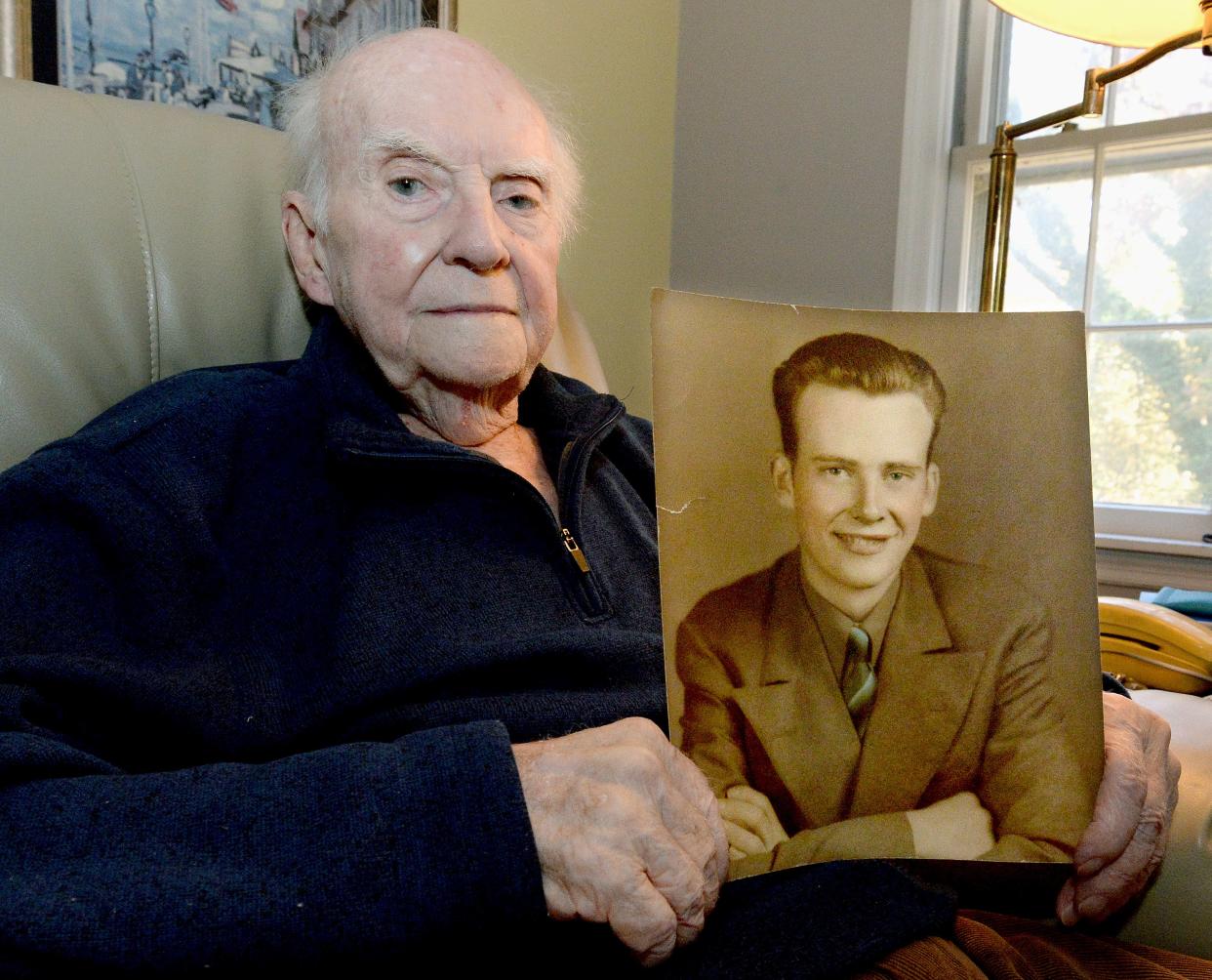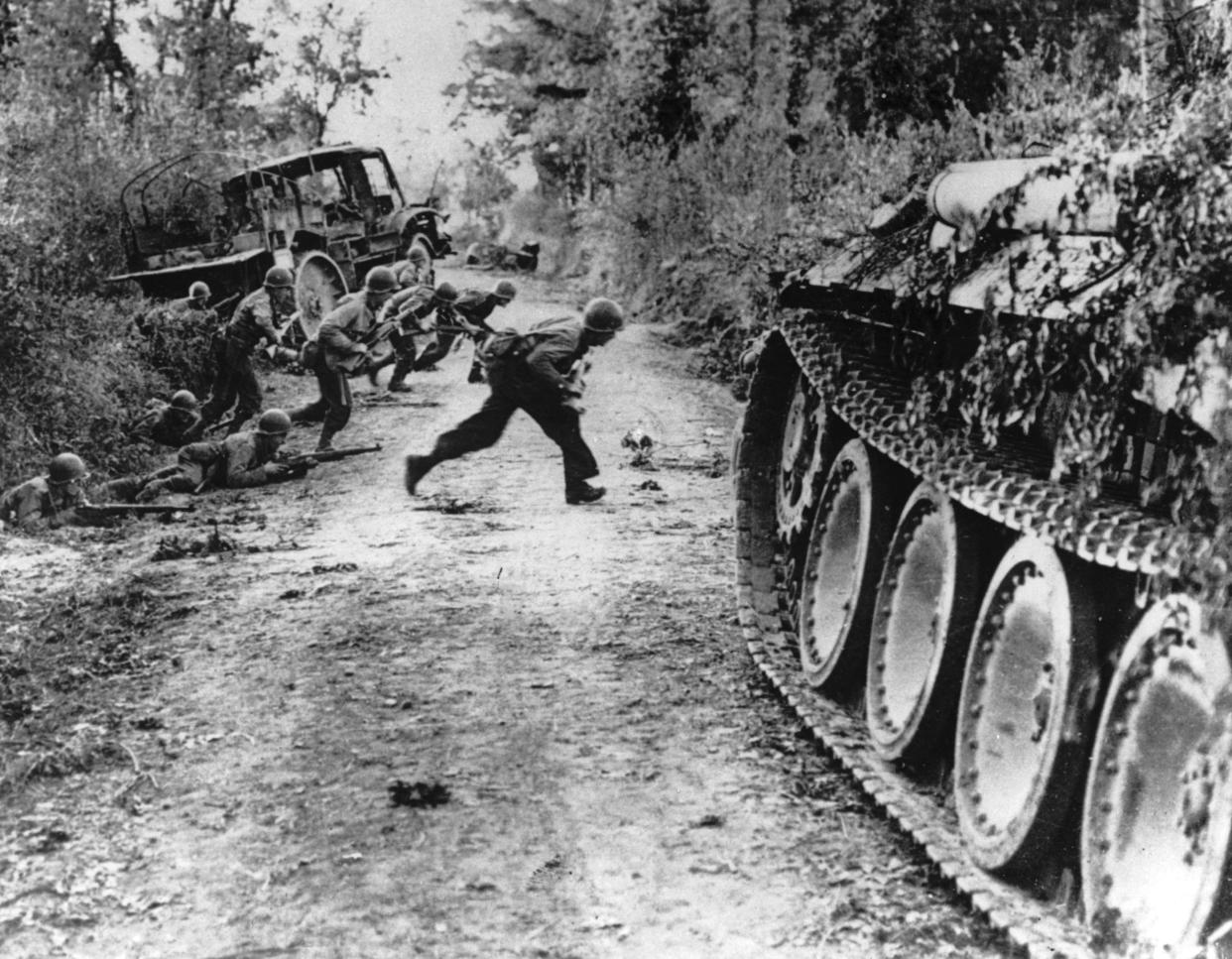After 80 years, Springfield WWII vet reflects on service and the 'misery of it all'

Sometimes marching through France, Belgium and into Germany during World War II, George Parnell recalled, he would fall asleep, and his dreams would take him back home to Springfield.
Enemy shells, he said, would inevitably puncture the peace.
"It's the opposite of what you should be doing," Parnell said. "You have a dream that you're home and you wake up and you're in a nightmare. And the nightmare is definitely real."
A rainbow in the storm: Erica Austin confronts cancer and inspires others along the way
That nightmare was all around him, seeing truckloads of dead servicemen, bombed-out villages, and hapless prisoners of war.
Part of the 29th U.S. Army Infantry Division that landed at Normandy days in the aftermath of D-Day, Parnell served as a bazooka gunner.
As Veterans Day approaches, he doesn't revel in the glories of war even though he agitated, against his father's will, to enlist in the war in the first place.
Even as he went about dutifully serving in the war, constant reminders of the "misery of it all" stayed with Parnell, 99, who returned to Springfield early in 1946 and worked as a bricklayer, raising five children with his wife, Frances, who died in 1968.
According to statistics from the U.S. Department of Veterans Affairs, just 119,550 of the 16.1 million Americans, less than 3%, who served in World War II are alive as of 2023.
All are in their 90s or beyond.
A longtime oral historian with the Abraham Lincoln Presidential Library and Museum said it's important to listen to surviving veterans' stories.
Mark DePue, who oversaw the oral history website at www.oralhistory.illinois.gov where over 1,000 interviews are posted, said those who want to capture such stories should have questions jotted down ahead of time and be prepared to listen.
'Where I wanted to be'
Parnell, who turns 100 on July 21, said he was anxious to enlist in the service, particularly after the bombing of Pearl Harbor on Dec. 7, 1941, though he was just a 16-year-old student at Feitshans High School.
Even at 18, Parnell said he needed his parents' permission, something his father, Dewey, refused to sign off on "and for which I later thanked him," he said.
Parnell ended up getting drafted in 1943, chose the U.S. Army and after several months' training stateside, landed in England awaiting Operation Overlord.
"It's where I wanted to be," said Parnell, in a recent interview at his home on the west side of Springfield, "but you soon found out that it ain't where you wanted to be.
"You find out (the Germans) can shoot back and they were better at it than we were."
A formative moment for Parnell was the first time he walked up to the front line and saw seven or eight dead GIs lying in a ditch.
The quartermaster would normally pick up dead soldiers, Parnell said, but wouldn't do so if there was fighting going on "so we'd have to do it ourselves and take them back to the battalion aid station."
Another time, Parnell was walking by as a team was picking up bodies.
"The guy was picking up a sergeant I knew (who had been blown up by a land mine)," Parnell said. "He asked me if I wanted his K rations. 'I said, No, I've got plenty.'
"Just demoralizing. This was 80 years ago. I think about it and makes me feel bad. Still does."
Parnell admitted to being "scared to death most of the time, plain and simple. Many, many times you have shells (falling around you). You can hear the bullets. Tracers.
"If I could've run home, I probably would have run home. But you still have to do your work, right? If they say you have to do this, that's what you do. I did what I was told to do and I'm glad it worked out that way, anyway. You couldn't live with yourself if you did it any other way. You can't quit. Quit has never been in my vocabulary."

'No glory to it'
Parnell's division arrived at Normandy after the initial wave of troops. He said he spent two months in a tent camp in England and at the time of the invasion was unaware of the number of American casualties.
After fighting the German army at battles in Saint-Lô and Brest, the division made its way across Belgium and Germany, stopping at the Elbe River where it made defensive positions and waited on advancing Russian troops.
"The only thing I was worried about when they said the war was over was that we had so many German prisoners, we had to make sure they weren't armed or anything," Parnell said. "We didn't even bother guarding them. They had so many of them, they didn't know what to do with them. We just told them to keep on going."
ISBE report card rates student performance; three area high schools cited as 'exemplary'
Even now, seeing images of fighting in Gaza and Israel, Parnell said it takes him back in time, if reluctantly.
"You wonder why mankind does that to one another," he said. "(Having been in war), you know how it is. I try not (to think about) that. If you find yourself thinking too much about it, you better change your mind. It's just not a good experience at all. There's no glory to it."
A licensed clinical psychologist who has worked extensively with veterans said Parnell feelings were understandable.
"You don't just extricate memories, especially traumatic memories, from your psyche," said Dr. Sara Bahn, a co-owner of Behavioral Health Center of Illinois in Springfield. "They're always a part of you, no matter what. They come out when you're reminded or you're triggered, especially visually. If you see an image on the television and it's associated with a similar experience, it's going to take you back to what you experienced."
DePue, the oral historian, said stories like Parnell's are "vitally important" to hear.
His suggestion to veterans' family members?
"If you can't find someone who's actually been trained and has experience with oral history interviews, sit down with a tape recorder and start asking questions," DePue said. "Once the recording starts, just stop and listen. Let them tell their story.
"To a certain extent people need to keep their own particular political views out of it and just hear from (the veteran's) perspective what was going on at the time and what it was like to serve."
Parnell said he has no particular Veterans Day plans. He appreciates those veterans getting the recognition they deserve, but for his part, he has never joined a veterans group or attended any of his division's reunions.
"There are a lot of stories about the wars and everything like that, but it's basically drudgery, just grind and grind and grind until you're just about ground out," Parnell said. "A lot of people break down, too, and I don't blame them. In WWII, if you broke down, they just pulled you off the line, gave you a good talking to and sent your ass back.
"But everybody's not made the same. If you can't stand it, you can't stand it."
Contact Steven Spearie: 217-622-1788; sspearie@sj-r.com; X, twitter.com/@StevenSpearie.
This article originally appeared on State Journal-Register: Springfield World War II vet reflects on service 80 years later
